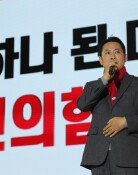Key to prosecution-police reform lies in checking presidential powers
Key to prosecution-police reform lies in checking presidential powers
Posted February. 15, 2019 09:27,
Updated February. 15, 2019 09:27
The South Korean presidential office, the government and the ruling party announced Thursday a plan to introduce a local autonomous police system, under which the national police’s responsibilities for keeping public order and investigative authorities to local police under direct control by local governments. The plan calls for pilot testing the system in five major cities and provinces this year before expanding it nationwide in 2021.
According to the plan, local autonomous police’s investigative power is limited to residents' livelihoods and related local issues, such as public safety, women, youth and traffic. Critics say that due to the autonomous police’s inability to investigate regular criminal cases such as murders and frauds, their roles are limited to just strengthened form of neighborhood patrol. It is no exaggeration that compared with autonomous police in advanced nations, the plan calls for autonomous police in name only.
Assuming that the investigative powers between the prosecution and the police are not adjusted, there would be no problem in introducing such an autonomous police system before slowly expanding local police’s authority. If the national police are granted investigative independence from the prosecution as a result of adjusted investigative authority between the prosecution and the police, it is as clear as daylight that the national police, with their national information-gathering networks, will have bloated power.
It is true that there are opposite concerns over strengthening autonomous police’s power. Considering the short history of the local autonomous governance system, local police with too much investigative power could become politically subordinated to heads of local governments or have collusive links with influential locals. There are also questions over local police’s investigative expertise.
Therefore, the police-prosecution reform should be directed toward addressing the opposing concerns at the same time. The core element of the reform is to strengthen the public control over the two power apparatuses. The prosecution and the police are two of the most important powers that make a president imperial. Whichever becomes more powerful between the prosecution and the police is not important to the public. Abolishing the prosecution’s right to direct police investigations could make things worse. However, the prosecution’s mighty power must not be left untouched. Most Continental European countries have panels that check the presidential power over the prosecution. The exclusion of such an aspect in the reform discussions is what make it difficult to both adjust the investigative powers between the prosecution and the police and expand the autonomous police’s power.
pisong@donga.com



![넘치는 전재수 과거 사진들…유죄의 증거일까, 무죄의 증거일까[청계천 옆 사진관]](https://dimg.donga.com/c/138/175/90/1/wps/NEWS/IMAGE/2025/12/20/132997378.1.jpg)


![“아무리 씻어도 안 빠져” 김치통 냄새, □□으로 싹 [알쓸톡]](https://dimg.donga.com/c/138/175/90/1/wps/NEWS/IMAGE/2025/12/18/132993861.3.jpg)
